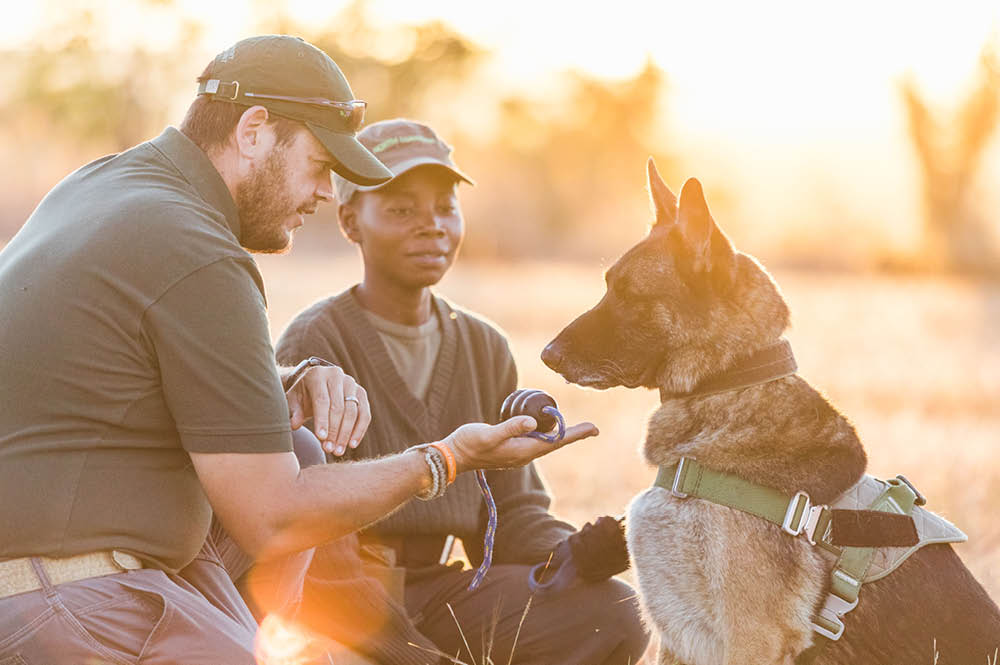Between running marathons as a rhino (he completed the 2018 and 2019 London Marathon in one of our costumes!) Benny Van Zyl leads the canine team at the North Luangwa Conservation Programme (NLCP). Benny’s expertise has helped transform NLCP’s dog squad into an effective tracking and detection unit. We spoke to Benny to find out about what each day in the dog squad entails…
What does a typical day look like for you?
Wake up, coffee, some office time, and then I’m off to train with our canine (K9) unit team. Most of the days our training is focused on conducting searches of buildings and vehicles, so that our handler and dog teams are well prepared to be deployed in real-life operations. We also regularly carry out scent-recognition training, which means that our dogs can effectively recognise and detect different wildlife products.
 How can dog squads help with rhino conservation?
How can dog squads help with rhino conservation?
There are many ways that our dogs help wildlife conservation in the region. The number one factor is acting as a deterrent. Our K9 unit is deployed frequently in areas surrounding the Park, and communities see first-hand how our dogs can easily sniff out and detect firearms, rhino horn, ivory, pangolin scales, bush meat or other illegal products hidden away. Our unit is often deployed on road blocks around the surrounding villages, making our presence known to any potential poacher or trafficker: they know they cannot hide things from dogs!
The unit has made some significant seizures over the years. We take a lot of firearms out of the system, saving lives in the process.
What breeds are best for these tasks?
When it comes to dogs, the importance of breed can be an overstatement. The effectiveness of dogs’ detection or tracking skills often comes down to their inherent drive, the training methods we use, and the time and effort we dedicate to their training. Just like with athletes, a great trainer will adjust their methods to suit the trainee’s need, rather than only working for the trainer.
My favourite breeds are German Shepherd, Belgian Malinois, Dutch Shepherd, Spaniels and Golden Retrievers. But that doesn’t mean that these breeds will always be the best dogs for conservation and anti-poaching work. Over the years, I have seen some mixed-breed dogs work much more effectively than a pure-breed dog. In my experience, it’s the time and effort invested into each dog that brings results in the field.
As a trainer, I look for specific drives in a dog that I can enhance with a good training programme. Drive is not something that can be taught; the dog either has it or not.
 What do you enjoy most about working with dogs?
What do you enjoy most about working with dogs?
I like everything about working with dogs. The bond between a handler and their dog is just so special, and it always makes me happy to see the pleasure a dog gets when he successfully sniffs out a target. Dogs have such distinctive personalities and it is great to see how they deal with different scenarios.
How do you keep the dogs healthy and happy?
We train hard, but we play hard as well. Our dogs get days off within the training schedule, and we make sure to give good-quality food and nutrition to all our dogs. We even run with our dogs on the airstrip by our HQ, which is also where we train for the London Marathon as part of Save the Rhino’s team!
Do you collaborate with other canine programmes?
Yes, we do. We collaborate very closely with the other units based in Lusaka, Zambia, and across the border in Malawi. Cross-border collaboration is essential to combat rhino-horn trafficking and other wildlife crime, as the criminal syndicates become ever-more sophisticated.
The recent Working Dog Workshops offer a great opportunity for all K9 unit programmes to learn from each other and exchange valuable skills and expertise. We are about to start a dedicated K9 exchange programme between Malawi and NLCP to help combat international wildlife crime.
What’s the hardest part of your job?
It’s very hard to work away from my family, but this will change as my family will soon be joining me at our HQ in North Luangwa!
What’s the best part of your job?
I love to see my handlers succeed in what they do, watching them improve day by day and gradually move up the ranking structure as their skills and experience grows. I really enjoy seeing how my handlers interact and create a special bond with the dogs.
A version of this article was originally printed in our annual supporter magazine, The Horn.








